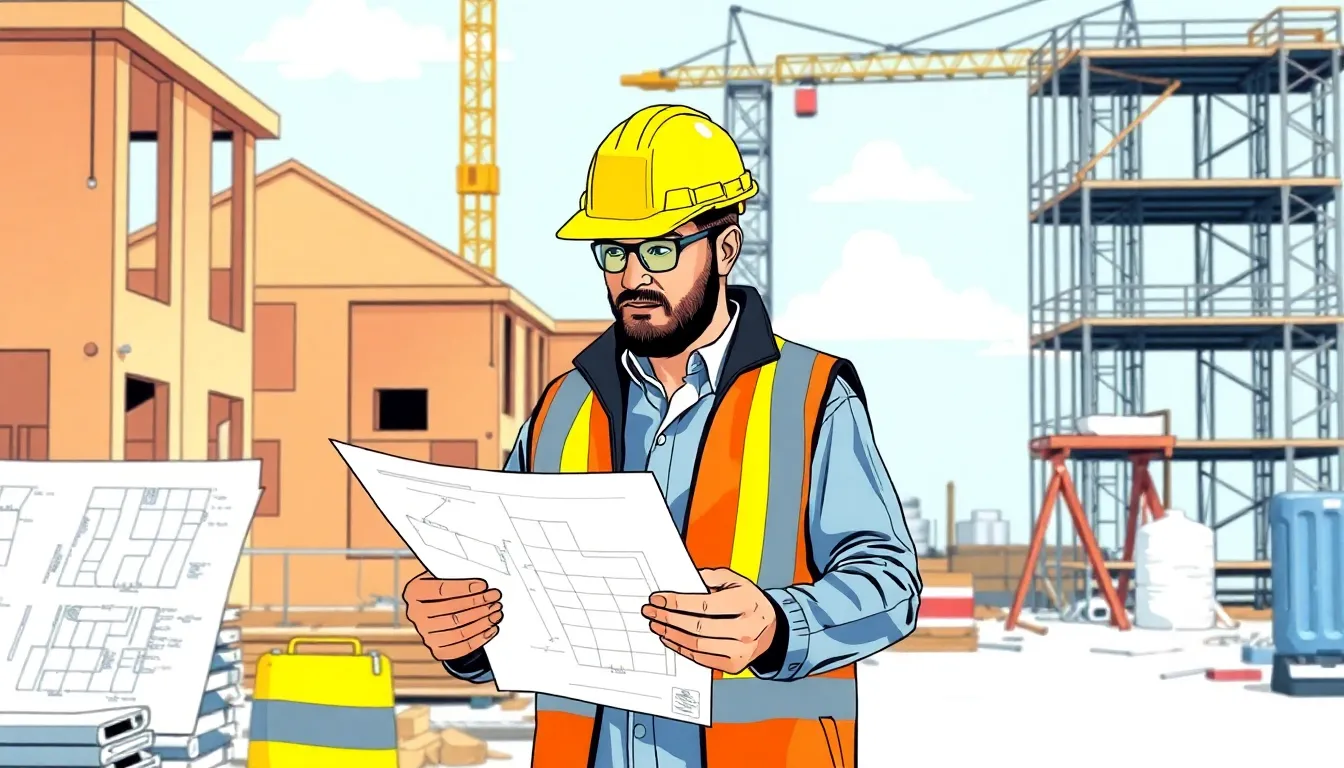In a world where every skyscraper seems to touch the clouds, the importance of a building construction certificate can’t be overstated. It’s the golden ticket to turning blueprints into breathtaking structures. Without it, one might as well be trying to build a sandcastle in a rainstorm—good luck with that!
This certificate isn’t just a piece of paper; it’s a badge of honor for builders and developers. It ensures that every nail, beam, and brick meets safety standards and regulations. Think of it as the superhero cape for construction projects, swooping in to save the day from potential disasters. So, whether you’re a seasoned pro or a curious newbie, understanding the ins and outs of obtaining a building construction certificate is crucial for anyone looking to make their mark in the construction world.
Table of Contents
ToggleOverview Of Building Construction Certificate
A building construction certificate serves as a key document within the construction industry. This certificate signifies that the proposed construction adheres to all local regulations and safety standards. Obtaining one is essential for any construction project, whether residential or commercial.
Compliance with zoning laws, building codes, and safety protocols occurs through thorough inspections before issuance. Each stage of construction typically requires verification to ensure standards are met. This includes structural integrity, accessibility, and fire safety measures.
Application processes vary depending on location, but generally involve submitting detailed plans and supporting documents. Local government agencies often review applications to confirm compliance. Applicants often receive feedback that may require them to amend their plans before approval.
Building construction certificates play a vital role in protecting the interests of various stakeholders. Investors gain confidence that their projects comply with legal requirements. Homebuyers benefit from assurances that their living conditions meet safety standards, leading to increased market confidence.
Non-compliance can lead to severe consequences, including fines and delays. Each jurisdiction enforces its regulations, emphasizing the importance of early consultation with local authorities. Hence, builders, developers, and architects must stay informed of the evolving regulations affecting their projects and procedures.
Overall, a building construction certificate is a foundational element in the construction process. It represents a commitment to quality, safety, and legal adherence, impacting all aspects of bringing a building project to fruition.
Importance Of Building Construction Certificate

The building construction certificate holds significant importance in the construction industry. This essential document ensures compliance with safety regulations and legal standards, safeguarding all parties involved.
Legal Requirements
Local governments enforce regulations governing construction projects. Obtaining a building construction certificate requires adherence to these regulations. Various documents, including detailed architectural plans, must be submitted for review. Inspections occur at different construction stages to confirm compliance with structural integrity and safety codes. Non-compliance can result in penalties, halting construction progress and leading to costly delays. Essential adherence encourages transparency and promotes trust among stakeholders.
Benefits To Builders And Homeowners
The building construction certificate provides multiple advantages for builders and homeowners. Safety assurance ranks high on the list, fostering confidence in the construction process. Homeowners benefit from knowing their investments meet regulatory standards. Builders gain credibility within the industry, appealing to potential clients. Timely acquisition of the certificate streamlines project timelines, minimizing disruptions. Moreover, a certificate adds value to property, attracting buyers looking for compliant and safe homes. These advantages demonstrate how vital this certificate is to successful construction projects.
Types Of Building Construction Certificates
Various types of building construction certificates serve specific purposes within the construction industry. Understanding these types helps ensure compliance with local regulations and safety standards.
Residential Building Construction Certificate
A residential building construction certificate is crucial for any structure designed for habitation. This certificate verifies that homes meet safety and zoning regulations. It encompasses compliance with electrical, plumbing, and structural integrity codes. Owning this certificate provides homeowners assurance that their properties are safe and legally compliant. Local governments typically review blueprints and conduct inspections to issue the certificate. Ensuring all elements, including fire safety and accessibility, meet standards is essential before approval.
Commercial Building Construction Certificate
Commercial building construction certificates cater to structures intended for business use. This certificate confirms that commercial properties adhere to relevant codes and regulations, including occupancy limits and fire safety measures. It covers a variety of commercial spaces, such as offices, stores, and restaurants. Obtaining this certificate requires detailed structural plans and thorough inspections by local authorities. Compliance with both federal and local regulations is critical. Securing this certificate enhances credibility, fosters investor confidence, and promotes a safe environment for patrons and employees.
Process Of Obtaining A Building Construction Certificate
Obtaining a building construction certificate involves a structured process crucial for ensuring compliance with local regulations and safety standards.
Application Process
Submitting an application for a building construction certificate typically begins with preparing detailed project plans. Local government agencies then review these plans to ensure they align with zoning laws and safety requirements. Once submitted, the application often faces a series of inspections at different construction stages. Completing these inspections successfully leads to the issuance of the certificate. Adjustments may be necessary based on feedback from authorities, reinforcing the importance of early and clear communication.
Necessary Documentation
Essential documents for the application include architectural plans, engineering reports, and site plans. Each document must illustrate compliance with relevant building codes. Additionally, proof of land ownership and environmental assessments may also be required. Gather these documents thoroughly to avoid delays. Submitting incomplete or incorrect documentation can hinder the approval process, emphasizing attention to detail in every application. Thus, maintaining organized records aids in efficiently navigating the certificate acquisition process.
Common Challenges In Securing A Building Construction Certificate
Securing a building construction certificate involves navigating several challenges. Regulations often vary by jurisdiction, leading to confusion during the application process. Local government agencies may require specific documentation, making preparation essential. Delays frequently occur due to incomplete submissions or insufficient details in project plans.
Understanding compliance with safety standards poses another hurdle. Builders face difficulties in meeting local codes, which can differ significantly between regions. Construction stakeholders must also address updates in legislation, ensuring that documents remain current and relevant. Failure to adapt to changing regulations can result in costly setbacks.
Thorough inspections are crucial, yet they can become bottlenecks. Multiple inspection stages assess structural integrity, fire safety measures, and accessibility, often extending the timeline for approval. Builders sometimes encounter issues related to inspector availability, causing cascading delays through the project schedule.
Communication with local authorities can present obstacles. Misunderstandings about requirements may lead to misfiled applications or missed deadlines. Clear dialogue helps mitigate these issues, reinforcing the importance of maintaining organized records throughout the process.
Moreover, the financial aspect of obtaining a building construction certificate cannot be overlooked. Unexpected costs associated with permit applications or required modifications can strain budgets. Stakeholders should prepare for such financial challenges by allocating funds for potential revisions or additional inspections.
Challenges in securing a building construction certificate stem from regulatory complexity, compliance requirements, inspection bottlenecks, communication gaps, and financial uncertainties. Addressing these obstacles with a proactive approach lays the groundwork for successful construction projects.
Securing a building construction certificate is a crucial step in the construction journey. It not only ensures compliance with safety standards but also protects the interests of all stakeholders involved. By understanding the application process and maintaining clear communication with local authorities, builders can navigate potential challenges more effectively.
Investing time and effort into obtaining this certificate pays off in the long run, fostering trust and confidence among investors and homebuyers alike. Ultimately, a building construction certificate is more than just a document; it’s a commitment to quality and safety that underpins successful construction projects.









